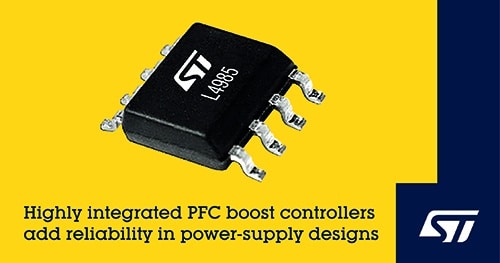STMicroelectronics has introduced new power-factor correction (PFC) boost controllers to simplify design and enhance flexibility of power suppliers.
The startup circuit plays a role of reducing the number of crossing points to one by modifying the transfer curve characteristics. It plays an important role in voltage and current circuits. Circuit design is a very rigorous job to do and get done without making a mistake. Circuit designers must test many times to make sure their design works efficiently and, most of all, is safe for a consumer to buy and use.

STMicroelectronics’ L4985A/B and L4986A/B power-factor correction (PFC) boost controllers comes with a built-in high-voltage startup capability saves auxiliary circuitry, allowing a “no aux” design that reduces bill-of-materials costs and ensures reliable starting. These circuits also include internal logic to safely discharge input-filter X capacitors when the AC line is disconnected. This eliminates the power losses incurred in a traditional discharge resistor.
The controllers suit multiple applications as PFC pre-regulators in equipment that must meet requirements for harmonic distortion, such as IEC 61000-3-2 and equivalents. These include power supplies for desktop PCs, servers, game consoles, and televisions, industrial and medical switched-mode power supplies (SMPS), and e-scooter chargers. By integrating a proprietary multiplier emulator, as well as dedicated circuitry to minimize total harmonic distortion (THD) in all operating conditions, the converters also ensure consistent power quality for LED luminaires.
The controllers benefit from a proprietary off-time modulator that further simplifies design by ensuring quasi fixed-frequency operation in all load conditions, entering burst mode at light load and zero load. The L4985A and L4986A operate at 65kHz, while the L4985B and L4986B are designed for 130kHz operation. The L4986A/B variants have additional power-good input and output pins that generate a logic signal to aid system management when the PFC output reaches a user-determined threshold.
Comprehensive protection and monitoring are also built-in, including overvoltage protection and protection against feedback loop failures, erroneous settings, and boost-inductor saturation.






